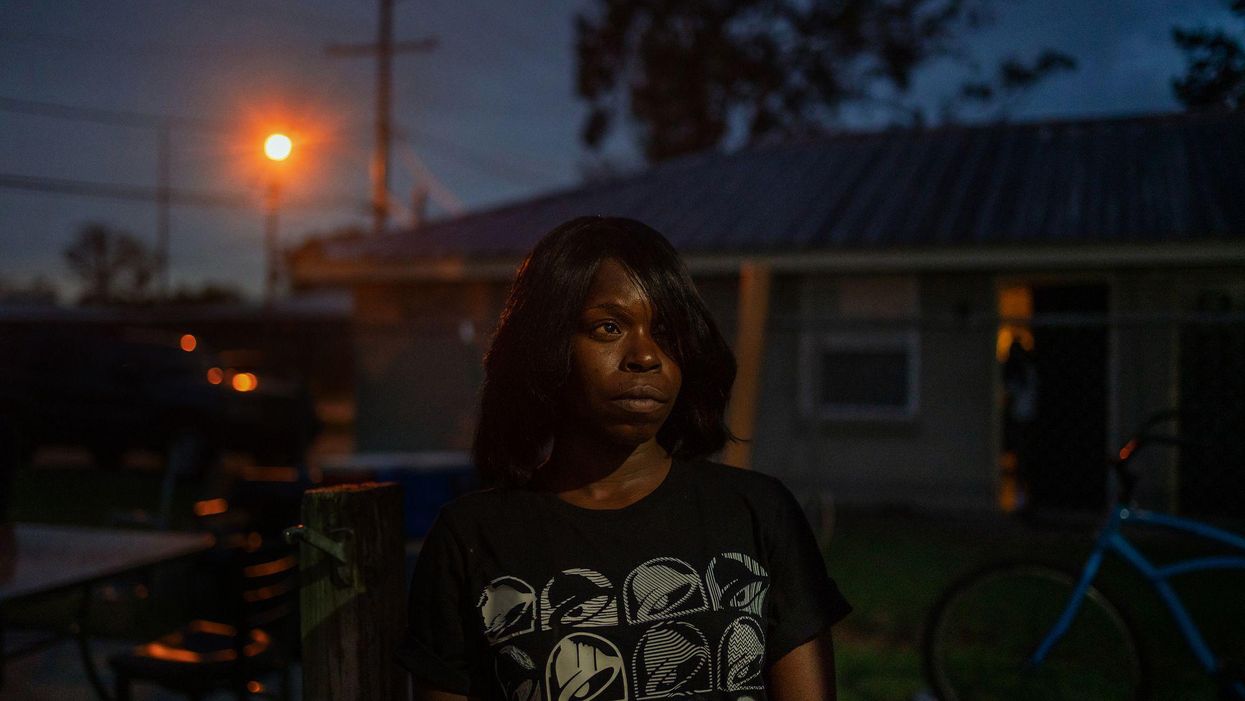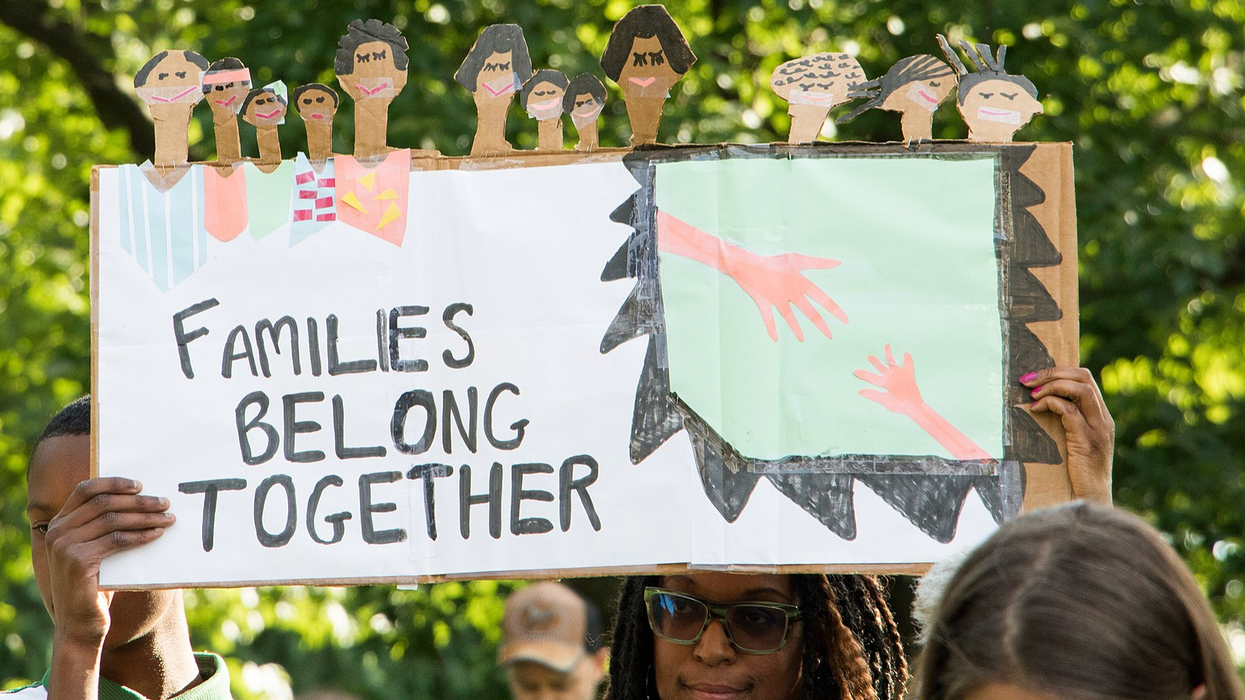Advocates Urge Federal Probe Of Shocking Police Violence In Jefferson Parish
ProPublica is a Pulitzer Prize-winning investigative newsroom. Sign up for The Big Story newsletter to receive stories like this one in your inbox.
The Jefferson Parish Sheriff's Office is investigating a deputy accused of holding a Black woman by her hair and slamming her head repeatedly into the pavement with such force that a witness to the September 20 incident said it ripped several of Shantel Arnold's braids from her scalp. A 14-second video captured the incident in the New Orleans suburb where, for decades, Black residents have accused the Sheriff's Office of targeting them.
It was the second time that hour that Arnold had been assaulted. By the time the deputies arrived, she said she had already fended off an attack by some local boys.
In an interview, the 34-year-old Arnold, who has not been previously identified, told the news organizations she had needed the police's protection. But protection is not what she got.
The video begins with a sheriff's deputy seen holding the wrist of Arnold, who is lying on her back on the sidewalk. The deputy appears to be dragging her along the pavement. The deputy then grabs Arnold's arm with his other hand and jerks her upward, lifting her body off the ground. They briefly disappear behind a parked white vehicle. When they come back into view, the deputy is holding Arnold by her braids, slamming her repeatedly onto the cement. At one point, he whips her down so violently her body spins around and flips over.
The footage ends as the deputy crouches down and places a knee onto Arnold's back.
In this case, the Sheriff's Office is conducting an internal affairs investigation into the incident, something it has not done in some similar cases, according to court records. ProPublica and WWNO/WRKF were able to confirm the probe because Arnold, who did not file an official complaint, and her relatives have transcripts of their interviews with investigators. But Sheriff Joe Lopinto did not immediately respond to requests for comment on the incident itself or his department's response to it.
For decades, members of the Black community have accused the Sheriff's Office of using excessive force against them, making false arrests and failing to rein in abusive deputies. Last month, a story published by WWNO/WRKF and ProPublica revealed stark racial disparities in shootings by deputies and systemic problems with transparency and accountability.
The investigation found that more than 70 percent of the people deputies shot at during the past eight years were Black, more than double the parish's Black population. In addition, 12 of the 16 people who died after being shot or restrained by deputies during that time were Black men. The investigation also found that the Sheriff's Office could not account for how often its deputies use force or how many complaints civilians lodged against its employees.
Lopinto previously declined to be interviewed about the news organizations' findings, saying only that when his deputies commit serious misconduct, they are arrested; he also noted that at least nine deputies, in a department of about 760 deputies, had been booked since he became sheriff in 2017.
Following the story, the ACLU of Louisiana called on federal prosecutors to launch an investigation into the Sheriff's Office.
Arnold's case raises many of those same issues. The evidence — based on interviews with the victim and the two witnesses, statements they provided to the sheriff's internal affairs division and the video — makes clear that something went very wrong when a citizen of Jefferson Parish needed help.
The incident started around 2 p.m. on Sept. 20 when Arnold was attacked by three boys as she was walking down the street near her family's trailer home. At 4-foot-8 and about 100 pounds, her left eye missing from a car accident years earlier, Arnold regularly made an easy target for the neighborhood bullies, her family said.
During the attack, which lasted several minutes and was captured in a cellphone video, the boys slammed Arnold to the ground and beat her while a crowd watched and laughed. She tried to defend herself with a stick, which is visible in the video. The assault ended only after 71-year-old Lionel Gray, whom Arnold considers her stepfather, chased the boys away.
Disheveled and covered in dirt, Arnold stumbled down the road toward her home when an unidentified sheriff's deputy rolled up beside her in his patrol car.
In the transcript of her interview with an internal affairs investigator, Arnold says: “I'm on my way home. I ain't make it all the way to the block, the police come out of nowhere, swarming, getting me like, 'Come here.' I'm like, 'What's going on? I just got beat up by two children, what ya'll doing?'"
Arnold said the deputy demanded she stop and talk to him. She told him that she had just been assaulted and wanted to go home, and she continued walking.
According to Gray and another witness, Arnold's 55-year-old uncle, Tony Givens, the officer jumped out of his vehicle, grabbed Arnold and threw her to the ground, unprovoked. Gray and Givens were standing at the foot of the family's driveway, about 20 feet away.
In an interview with the internal affairs investigator, Gray said that Arnold didn't pull away. “She didn't have a chance to pull away because, you know, this guy was strong. He grabbed her arm, and some kind of move he made, and she went down to the ground. ... So I was walking up to him and he told me, 'If you come any closer I'm going to kick everybody's ass out here.' So, I said ... 'you don't have to use that type of force on that little woman right there, she's a midget.'"
What happened next was picked up on a video shared on social media and viewed more than 130,000 times. It is unclear who took the video, which is the only footage of the incident to have surfaced; the Sheriff's Office remains one of the few large law enforcement agencies across the country that does not use body cameras. This week, however, the Sheriff's Office announced that it had signed an $8.7 million contract for 500 body cameras that would be deployed by December.
Lopinto said that the contract had been signed in June, “well before any of these articles that were written," and that he didn't say anything publicly because “really nobody has asked me. It's not like I denied it," he said.
WWNO/WRKF and ProPublica sent the Sheriff's Office an email on July 29 specifically asking about the fact that the office had not yet adopted body cameras. The Sheriff's Office did not respond to that email, five follow-up emails and multiple voicemail messages, texts and a certified letter.
Arnold told investigators with the Sheriff's Office that it was not the boys but the deputy who caused her injuries, which included bruises and scratches across her body, a busted lip and recurring headaches. Deputies on the scene called an ambulance, which took Arnold to a local hospital. She was not charged with a crime.
Alanah Odoms, executive director of the ACLU of Louisiana, said the video of Arnold and the deputy was “yet another testament to the shocking frequency that JPSO targets and brutalizes innocent, unarmed members of the Black community."
Sam Walker, emeritus professor of criminal justice at the University of Nebraska at Omaha, called the deputy's actions in the video “outrageous" and questioned whether the Sheriff's Office properly trains its deputies in control tactics or de-escalation techniques.
“There are essentially two answers here. One is they do, and he ignored his training," Walker said. “Or answer No. 2 is no, they don't, which is to say their training program is completely unacceptable. So, it's either him or the organization."
The video of Arnold and the deputy also raises new questions about the Sheriff's Office use-of-force policy, which activists and critics have assailed as vague and insufficient.
They have also said that the department lacks transparency around use-of-force incidents. According to the news investigation published last month, the Jefferson Parish Sheriff's Office was unable to produce any documents related to non-shooting use-of-force incidents. The research organization Police Scorecard Project made a similar request for data on use-of-force incidents; the Sheriff's Office responded by saying those records don't exist.
Shortly after Arnold had been taken to a hospital by ambulance, her sister, Mercedes, arrived on the scene. Mercedes, 32, said the deputy accused of attacking her sister was still present and tried to convince her to call the coroner to have Arnold committed to a hospital for mental health problems. She refused.
“He was just trying to cover up what he did by saying my sister is crazy," she said.
In the following days and weeks, Mercedes and multiple family members said, the same deputy has rolled by their house multiple times in what she believes to be an attempt to intimidate them. But she said she and her family are not afraid and will continue to speak up until the Sheriff's Office holds its deputies accountable.




